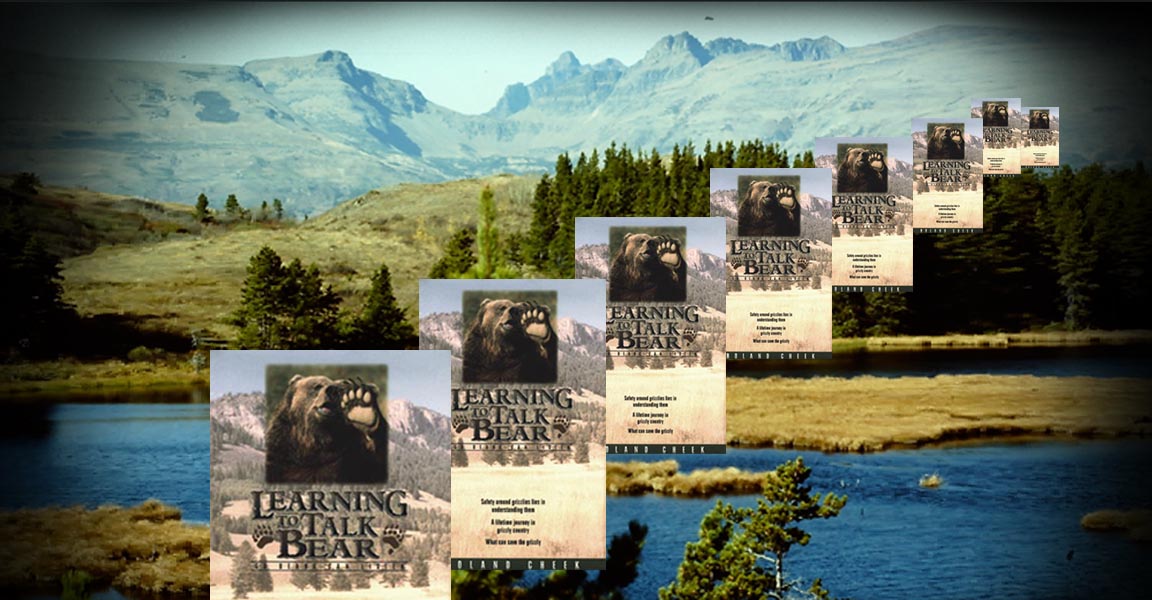

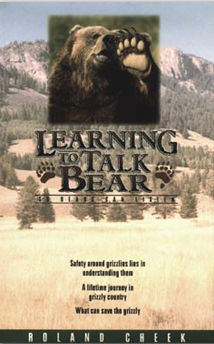
God's music is wind soughing through threetops, dove wings whispering at waterholes, the mournful cry of a lost-in-the-fog honker. It's a harmony that became addictive, and carries even into my dotage. Elk music took me to the dance. Bears -- particularly grizzly bears -- keep me dancing.
Grizzlies, you see, are the Marine Band of the animal world. They swagger with the calm indifference of an animal who knows he has nothing left to prove. So why does this John Philip Sousa of wildlife resonance -- an animal who may really believe us superior creatures, but who are in no way reconciled that we are masters -- receive such a bum rap from the planet's most fearsome other creatures ... us?
Good question; not all grizzly bears are Jack the Rippers in fur coats. Perhaps that's the reason for this book.
what people are saying:
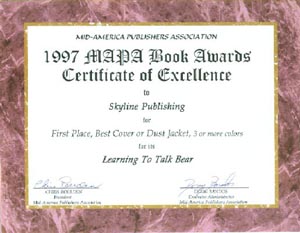
Learning To Talk Bear is Roland's best selling book -- now in it's 5th printing. The book was offered to 17 different publishers and rejected by all. "Who cares about grizzly bears?" they said. Well, for starters, how about the 2 million people visiting Glacier Park and 3 million visiting Yellowstone each year? So Roland and Jane published the book themselves. They're laughing all the way to the bank.
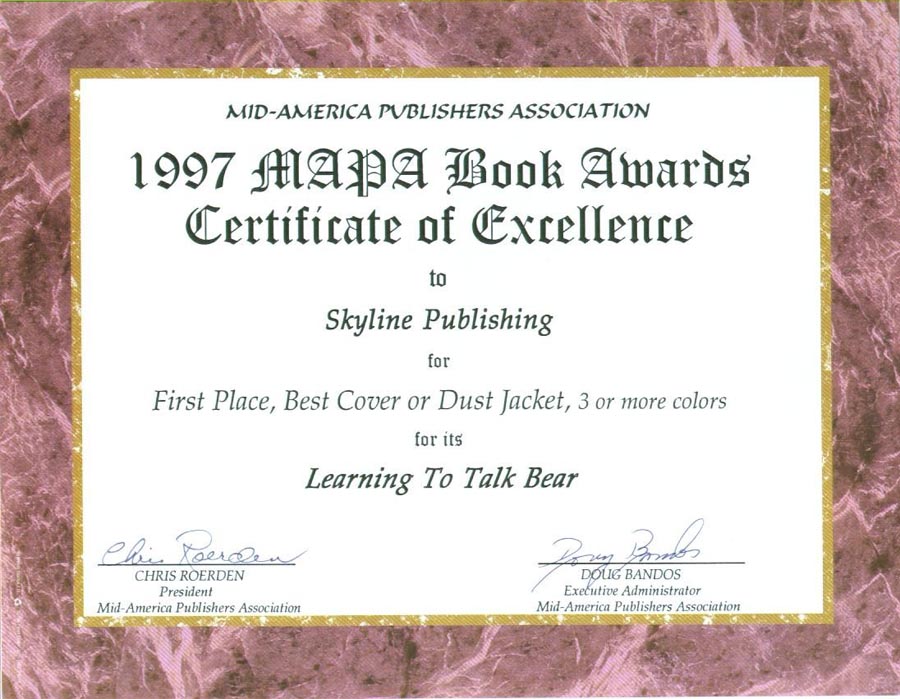
The book Learning To Talk Bear is the best book I have ever read and prepared me for my first grizzly sighting.
-an amazon.com five star (*****) review from Elizabethtown, PA
I bought this book Learning To Talk Bear because I desire a knowledge of bears, their life, their existence. Reading this book has opened my eyes to more than I ever thought there was to learn. I even bought a map so that I could see the areas he describes. If all books about grizzlies and bears are this enjoyable, I have a lot of reading to do.
- [ email from Susan Bearer ]
Roland Cheek, a former outfitter and now an outdoor journalist who has studied and observed grizzlies for many years . . . says that most novice outdoors folk are fearful or uncomfortable while hiking or camping in grizzly country. And why not? Most print or broadcast journalism covering bears seem enamored only with grizzlies that kill or cripple people. . . . How great is the risk? Not nearly so much, Cheek writes, as one might think, provided people understand bear ettiquette and use travel and camping practices the animals can understand. Such ettiquette and practices are described in "Learning to Talk Bear." To write the book, Cheek took advantage of new research indicating that grizzly bears are trying to get along with their human neighbors. Indeed, as Dr. Charles Jonkel, dean of American bear researchers, says: "Bears have better senses than we do and they know their environment better than we do.If we only knew how many thousands of times each year they take care of us ... and we
don't even know they're around." Jonkel says in the book that there are two reasons people are killed by bears. First, people do not understand bear ettiquette and second, people's rules are too inconsistent for bears to understand. Study bears have been closely monitored for years. Discoveries include grizzlies living in areas densely populated by humans who don't know the bears are nearby. In other cases, the bears appear indifferent to humans: sow and cubs feed on lawn clover while subdivision home owners shoot video footage through their living room windows. The outdoorsman or woman, however, mainly is concerned with how bears may act in the wild if they are unexpectedly encountered on the trail or if the bears enter a camp. The book describes many experiences Cheek and others have had with grizzlies, including some hair-raising stories that most people are content to read about rather than experience firsthand. Cheek is a strong believer in continuing bear
research and sharing the information with the public. The bear's future depends upon people being educated and understanding more about bears. Cheek points out that he spent over half a lifetime amid the great beasts without being seriously charged, mauled or batted around by a grizzly. He wonders at the book's conclusion if he was just lucky or if he had inadvertently learned to talk bear?
*********************************
Tacoma's The News Tribune had this to say, by Outdoor Editor Bob Mottram: Cheek is at his best when he's describing bears in action, and at his best, he's excellent
more reviews
"I just read Learning To Talk Bear, in fact I read it twice, I wanted to make sure I didn't miss anything. - Harry Fuller / Helena, MT
"It is about time somebody wrote a book that could be understood by the general public about the grizzly bears and wild country." - Smoke Elser / former Pres. MT Outfitters & Guides Asso.
* Is the above testimonial why one contest judge in the Crown of the Continent Nature Writing Contest wrote on her evaluation sheet: "Wonderfully readable--colorful--should have appeal to a wide and necessary audience. "
"New book paints perfect portrait of grizzlies."- Mark Henckel, Outdoors Editor, Billings Gazette
"Roland, have you considered having your books transcribed to tape?"- Joe Garcia
[Joe is visually impaired, for him and others like him, Learning To Talk Bear is available through Montana's Talking Book Library--ask your librarian.]
"Your story (Learning To Talk Bear) was so moving, so humorous, and very personal." - Cheryl Fryberg/ Marysville, WA
"... I started to read it and it keeps you wanting to finish the story. It sounds just the way Roland told his stories around the campfire."- Blanch Hilliard / Sugarloaf, PA
"Just finished Learning To Talk Bear, and felt I just had to tell you what a great job you did on it." - Bud Journey / Libby, M
other publication reviews!
LEARNING TO TALK BEAR, by Roland Cheek, Skyline Publishing Co., Box 1118, Columbia Falls, MT 59912 (406-892-0123); 1997, 320 pages. soft cover, $19.95 postpaid.
During 20 years as a guide and outfitter in the Bob Marshall Wilderness, Roland Cheek was bound to bump up against a grizzly bear now and then.
At first, he had his mind set on a grizzly rug. But when his chance finally came -- an easy shot at a magnificent bear in the days when Montana still had a limited grizzly bear season -- he turned it down, and wasn't sure why.
He says, "... my regard for the animals bounced about like a yo-yo. First my attitude was uneducated fear, then armed disdain that eventually led to unarmed, unreasoned fear. From there it was transformed to unbridled admiration that led to what approached blind homage for the cuddly creatures. Then it turned into grudging respect, and probably a creeping suspicion that I really didn't know what to think about an animal that was edging deeply into my soul."
He began talking with the biologists who study grizzly bear behavior, and gathering information on the great bears wherever and whenever he could. His book, a fast-paced blend of first-person accounts and the results of recent grizzly bear research, provides valuable insights into what humans must do to live with bears, and why.
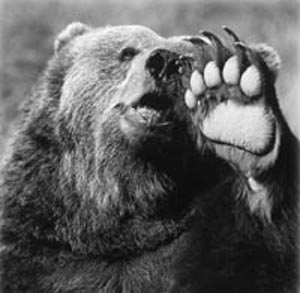
WRITETRACK, by Mack McConnell
Learning To Talk Bear
... Fido stops barking. The next thing you see is Fido coming at a dead run toward you with his hind feet reaching clear past his ears trying to get traction on more real estate.
Behind Fido is something brown and silver, and large, very large. The brown blur is also coming your way, like a furry locomotive.
About this time you realize that Fido has become a retriever. He's found a bear and he's bringing it to you. And this is no ordinary bear, Fido is bringing you a grizzly.
... In his book, "Learning to Talk Bear," Roland Cheek had a dog and bear experience similar to the one just described. The incident happened not long after he came to Montana. Like so many newcomers, he fell in love with the mountains of western Montana. He also fell in love with the feathered and four legged residents of those mountains. Through his many years as hunter and then guide, and now journalist, he has been especially fascinated by Ursus arctos horribilis, the grizzly bear.
Cheek's bear book is a compilation of true stories and observations of grizzlies, grizzlies research and comments on how people and grizzlies have affected each other since the 1960s.
I highly recommend Cheek's book for anyone who loves or hates, grizzlies or anyone who just wants to understand them.
... Cheek's book has more valuable grizzly information in it than I can even touch upon here. And it is packaged in some very enjoyable reading. Read it for the fun of it and you will learn a lot along the way. It may not change your opinion of grizzlies, but at least your opinion will become an informed one...
The Brittany spaniel burst over the hill. That the mutt was in unaccustomed flight didn't register until the angered grizzly bear exploded into sight, hind feet spinning past ears in hot pursuit.
Hunter had, for eight years and thousands of wilderness trail miles, traveled as my companion. Over those miles and during those years, I'd seen him put the run on several bears met in surprise encounters. And I know the wide-ranging dog had confronted others beyond my ken without so much as a speck of unpleasantness. But this bruin was different; this one appeared to have no clear grasp of either canine or ursine custom. Prudence dictated the dog's options.
The spaniel was, of course, more fleet than his pursuer. But each time he gained ground, the dog, disbelieving a bear like this existed, slowed to hurl another intended-to-be-intimidating bark over his shoulder.
To the grizzly, the dog's pauses served as teasers and the barks insults. I might have though the scene hilarious had not the runaway caboose and its trailing locomotive been headed for my station. The dog gained a few steps and again lost ground by slowing to curse his ursine pursuer, then wheeling and racing toward his master. If the stupid mutt expected me to get us out of this brouhaha, he would've been comforted to know my thoughts were coursing along the same lines. . . .
© 2013 All Rights Reserved